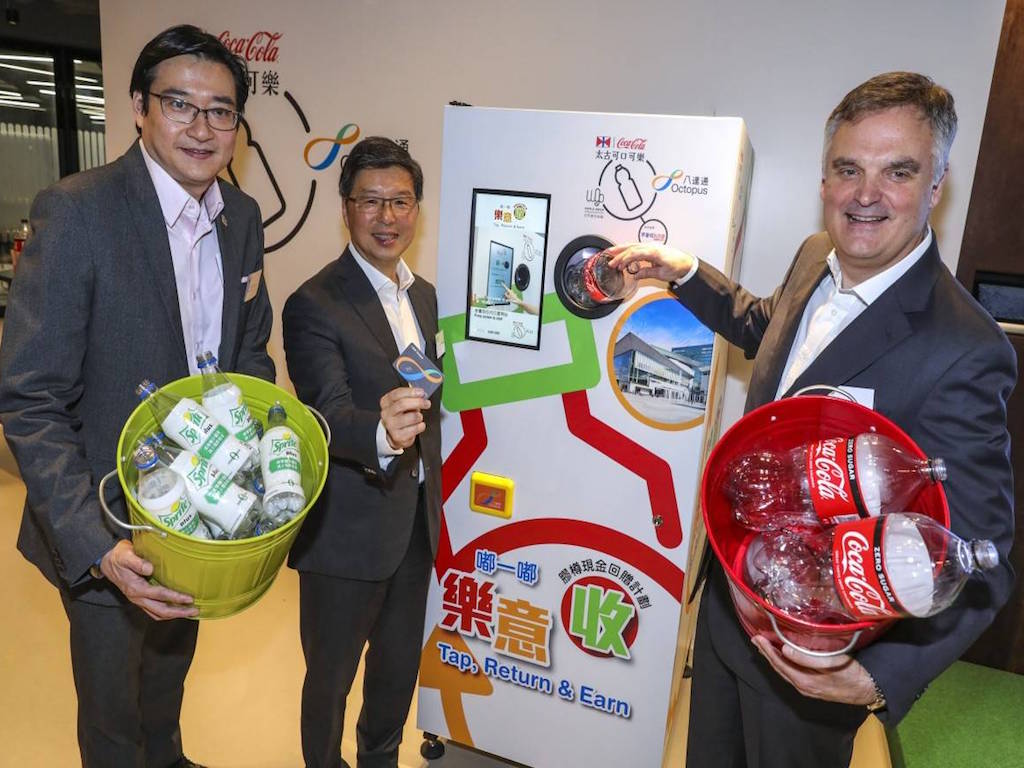3 Mins Read
Swire Pacific Group’s Swire Coca–Cola has just unveiled their reverse vending machines that will reward consumers HK 20 cents for every plastic bottle inserted for recycling via Octopus cards. Rolling out the scheme in 10 locations across the city, the giant distributor group hopes to change consumer attitudes towards recycling in Hong Kong. The programme is a welcome addition to fill the recycling void in Hong Kong, a city where accessible recycling facilities, collect-back schemes and plastic return points remain a rarity. This is in contract to other major cities in Asia-Pacific such as Taipei and Tokyo.
This month, Swire Coca-Cola has launched reverse vending machines developed by Hong Kong-based green tech-solutions company Cornerstone Technology in 10 locations across the city. These locations include Pier 3 in Central, Tseung Kwan O Plaza, Festival Walk in Kowloon Tong, Metro Plaza in Kwai Fong, Taikoo Place in Quarry Bay, Chinese University of Hong Kong, The Mills in Tsuen Wan, and Citygate and HKSKH in Tung Chung. Users can activate these machines via their Octopus cards and insert empty plastic bottles from any brand to receive a reward of HK 20 cents per accepted bottle. The bottles, which are crushed by the machine, will be sent to the new large-scale recycling plant is being built in Tuen Mun’s EcoPark, set to open in 2020. The plastic recycling facility is a joint venture between German waste management firm ALBA, Swire Coca-Cola and Baguio waste management.
Commenting on the recycling scheme, which remains on a trial basis in the short-term, Swire Coca-Cola’s executive director Neil Waters told the SCMP: “Today, the behaviour is not towards recycling, and we are trying to change that. We will accumulate evidence and experience with the machines, and see what happens.”
Hong Kong is a city facing a monumental plastic waste crisis not only because of consumer habits, but also due to the lack of recycling solutions. In 2017, Hong Kong produced 50,000 tonnes of PET bottle waste, with only 8.5% recovered for recycling. The Hong Kong government’s Environmental Protection Department (EPD) made small attempts to tackle the problem through plastic-free schemes, but the fact remains that there are too few collection outlets available for people to recycle items.
Local NGO World Green Organisation, for instance, found in a survey that over three quarters of Hong Kong respondents cited inconvenient locations and insufficient recycling bins as a key reason for not recycling. In sharp contrast to Hong Kong, other major cities in Asia, such as Taipei, have many drop-off points for single-use and recoverable items in convenient locations such as supermarkets and stores.
The lack of action against plastic pollution in Hong Kong has led to a waste disaster – from overflowing landfills to littered streets and coastal regions, which cycles back into our water system and food chain once broken down into microplastic.
With the authorities slow to act against plastic waste at source or to implement city-wide recycling points, Swire Coca-Cola’s reverse vending machine are a positive step forward. Other companies have also stepped up to fight plastic, such as Watsons‘ recently announced Go Green Initiative with plans for 100 water refilling machines and 400 plastic bottle collection points across its stores. While these measures are to be supported, more must be done in a city where shockingly, over 5 million plastic bottles are sent to landfill every day according to a 2017 estimate.
Lead image courtesy of SCMP / May Tse.




